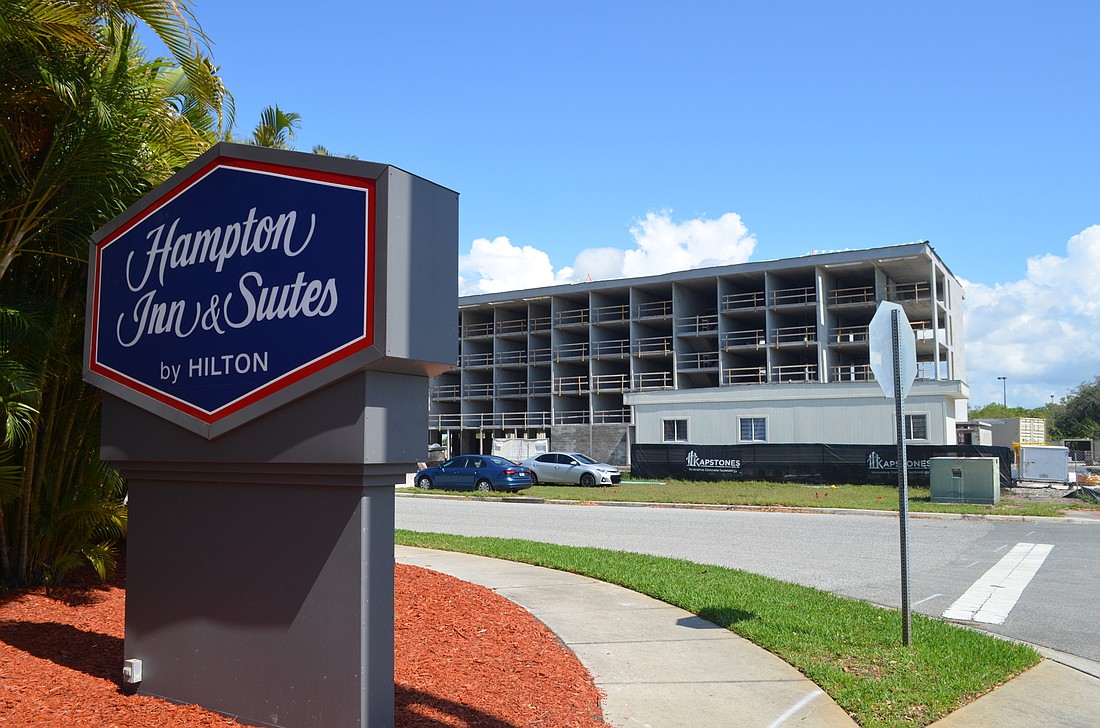- May 4, 2024
-
-
Loading

Loading

How many hotel rooms is too many for Sarasota?
If you ask John Patterson, that’s not a question for the city to decide — at least not on a project-by-project basis.
Patterson is an attorney representing SRQ 2 LLC and SRQ 3 LLC, the leaseholders for two properties at 965 University Parkway and 995 Airport Circle. On Feb. 19, Patterson filed a letter with the city appealing the Planning Board’s decision to reject a proposal to build an additional 102 hotel rooms on those two parcels, located near Sarasota-Bradenton International Airport.
In the letter, Patterson took issue with the Planning Board’s rationale for rejecting the projects. The underlying land, which the Sarasota Manatee Airport Authority owns, carries a zoning designation that allows for the construction of hotels. The city had already approved the construction of 92 hotel rooms on the University Parkway property. City staff recommended approving the plans, albeit with some conditions.
But after hearing testimony from competing hotel owners who expressed concern about how additional rooms might hurt the market in Sarasota, the Planning Board voted 3-2 to reject the proposal at its Feb. 13 meeting. Patterson criticized this rationale, stating the Planning Board was not responsible for protecting the interests of neighboring businesses when deciding if a proposal complied with the zoning code.
“You can’t pick the winners and losers in the zoning game,” Patterson said. “It’s just simply impermissible from a legal standpoint.”
The hotel projects went to the Planning Board because the applicant sought to revise a 2007 development agreement, which capped the number of hotel rooms on the land at 200. However, per a Land Use Equivalency Matrix also included in the development agreement, the leaseholders were allowed to seek up to 300 hotel rooms on the property if they decreased the intensity of another allowed use.
In exchange for increasing the allowed number of hotel rooms from 200 to 300, the application proposed reducing the permitted office space from 200,000 square feet to 171,250 square feet. The ratio aligned with those outlined in the Land Use Equivalency Matrix, and Patterson argued the application was mostly a procedural matter.
The Planning Board members tied their decision to an element of the city’s standards for reviewing adjustments to the prior development agreement. The code directs officials to consider “whether the change suggested is out of scale with the needs of the neighborhood or the city.” Planning Board members Eileen Normile and David Morriss said reports of a troubled hotel market from other business owners suggested an increase in the number of hotel rooms would be out of scale with the needs of the city.
“Obviously, we’ve got hotel owners in the audience who are concerned,” Morriss said. “I’m not entirely sure I agree it doesn’t harm somebody else to build hotel rooms and then basically make other ones go fallow.”
Hotel owners near the airport and on the North Trail appeared at the Planning Board meeting to request the denial of the proposal. Jeff Antonaccio is regional vice president of operations for Mc-Kibbon Hospitality, a company that manages the Residence Inn and Courtyard by Marriott near the airport. Antonaccio shared a letter from the hotels’ owners stating occupancy has been trending downward in the area since 2015.
He said the proposed development would negatively affect the two neighboring hotel properties.
“There’s just an oversaturated market with no new demand generators,” Antonaccio said.
City staff said they do not try to forecast market conditions when reviewing plans, instead looking to the comprehensive plan for guidance on whether a project is in keeping with the city’s interests. Because the land is zoned for intensive commercial use, and because similar uses already exist in the area, staff determined the proposal was appropriate.
If financing made a hotel project feasible, Planning Director Steve Cover said it made sense why the applicant would prefer that option rather than attempting to build the permitted office space.
“The office market’s been dry for a long, long time,” Cover said. “If you owned a piece of property, would you sit and wait until the office market gets good, or would you move ahead with another kind of use that would be successful?”
A city spokesman said the City Commission is scheduled to discuss the requested appeal March 18. Although Planning Board members and hotel owners see valid reasons to reject the plans, the developer believes it’s within its rights to move forward with more hotel rooms.
“I think it’s a slippery slope when we start to protect markets in fear of competition,” said Marc Gagliardi, a representative for SRQ 2 and SRQ 3.